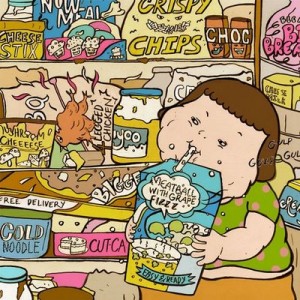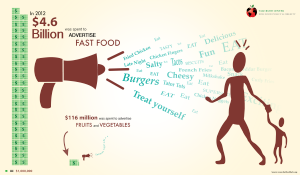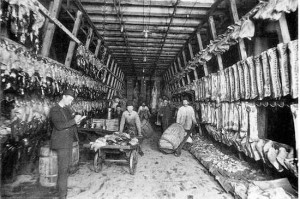
The food industry is one of the most important yet controversial industries in modern capitalism. Established by a few big name brands, the food industry is comprised of big businesses trying to make the biggest bang for their buck. However, the methods used in order to ensure efficiency and create the cheapest possible product, comes with a price. We have discovered in class that food industry uses unsanitary and dishonest techniques in order to maximize their profit. With the recent exposure towards to methods that they normally keep behind the scenes, the food industry has been taking hits from people and companies that value healthy foods and a healthy environment. There is conflict between being healthy, and promoting health and well-being, and supporting the capitalistic business methods that exploit the system by practicing unsanitary and dishonest methods, but, yield the most in profit and efficiency. The question that I would like to bring up is: should the food industry be a part of the capitalistic system, or should a new structure be implemented that eliminates dishonesty to the public?
The intricate factor that a food company has versus, let’s say, a software company, is the fact that every human needs to eat. There is a large percentage of the population that does not have access to fresh and wholesome food, and therefore, taking away opportunities for people to be healthy. They are stuck buying cheaper products such as soda and fast-food, and are unable to control their diet due to economic issues. Organic companies are usually smaller establishments, and/or controlled by larger businesses. Due to the rigged system of capitalism, the smaller, health-branded companies’ products are marketed at a significantly higher cost. This is due to the fact that the larger food companies have the power, money, and resources to have cheaper prices, and run the smaller industries out of commision. In the movie Food Inc., a family explains how they are caught between buying quality food due to the high cost of medication for his diabetes, an illness that is correlated to what you eat and your body’s health. Paradoxically, purchasing high cost medication over healthy foods results the continuation of the family’s state of bad health. This cycle continues over and over again to people who suffer from poverty. Everyone should be able to have access to live a healthy life; it should not be determined by your economic standing.

Food companies, such Tyson, have mastered a system that yields the most efficiency for their product. They are able to mass produce food at a fast rate for the lowest possible cost. Customers are grateful for these low prices, and continue to purchase their products. The companies are doing their job, and we as consumers love the affordability of their product. But, ethically, is it right to support companies and their dishonest methods? There are two schools of thought. One, that we, as the customer, are not at fault. We have the final say in what we purchase, and that the cruel methods have no effect on our lives or the product, so why should we be complaining about the efficient and low prices of the food. Hurst, writer of Organic Illusions, explains that “plants and animals aren’t the least bit interested in the story the farmer has to tell. They don’t care about his sense of social justice, the size of his farm, or the business model that he has chosen. Plants don’t respond by growing better if the farmer is local, and pigs don’t care much about the methods used in the production of their daily ration. If those inputs that animals and plants require to grow are present, plants and animals respond in pretty similar ways. That means that when organic and/or conventional farmers provide the environment necessary for growth, plants and animals respond.” It is argued that anthropomorphism only limits ourselves as humans. However, we should not only practice for the sake of the environment and livestock, but for the sake of our own health. The other, that we as the customer have the power to change this seemingly rigged system, so why should we sit back and accept the cruel methods of the industry. The only way to make change is to change. While the food industry may be unsanitary and cruel to animals, they are still technically producing food legally through government regulation. The issue is not necessarily about their food production, but the amount of power and influence they have on smaller and less established organizations. We have the power to change if we really want to, but it has to be a collective effort in order to make a stance against the establishment. Are we willing to pay a little extra money for a more organic product?
From a capitalistic perspective, the organic and healthier food industries would have to somehow combat the already established companies low priced products. From a liberal, almost socialistic perspective, the government would have to more gain control over the industry as a whole. Barry Yeoman, author of the Organic Food Paradox, writes “if there was ever a time when consumer demand could support organic farmers like the Bowerses, that moment is now. Americans have grown savvy to the health and environmental benefits of foods produced without chemical fertilizers or pesticides. Organic food sales grew 7.7 percent in 2010 to $28.6 billion, more than ten times the growth rate for all food. Organics now command a 4 percent share of the total food market, up from 1.6 percent a decade ago.” This increase in growth is only the beginning for the organic revolution.
The increase of competition in the food industry will cause the power that the food industry holds to be re-distributed to the people. The people should hold the power in what they want to purchase, and WHAT they are purchasing. However, should food be handled by businesses, or the government? As humans, I believe that everyone should have the ability to obtain a healthy meal. The fact that people are unable to eat healthy and then become unhealthy due to economic issues is not right. People end up getting caught in this cycle of lack of health and are stuck contributing to the system. I believe that the structure of how we grow and produce our food needs to progressively change to support the health of everyone.
In 1906, Upton Sinclair published The Jungle, a novel that exposed the food industry in a light that would gain attention politically through socialistic commentary. He described these meat factories as “dingy,” “whose labyrinthine passages defied a breath of fresh air to penetrate them, and there were rivers of hot blood and carloads of moist flesh,” that “smelt like the craters of hell.” Rightfully so, Teddy Roosevelt established the Federal Meat Inspection Act, and other regulations to make sure the food industry was following a set of guidelines to ensure a quality product. This was the first of many acts and bills that involved the food industry. Nestle explains that “prior to the 1800s, the U.S. government took no responsibility for food safety.” Government regulation was the first step in ensuring a wholesome product, but businesses were still able to exploit the system in order to make prices cheaper. There needs to be a balance between the amount of freedom farmers have and the amount of control the government has on the product.

We are at a time in history where we the people have the power to determine how our future will turn out. With an rapid increase in technology and innovation we are at the crossroads of the future of the American system. It is the beginning of new reforms and lifestyles that will change the American standard, and it is in the palm of our hands. The food industry has been a crucial part of our society for over a century, and has had tremendous impacts on our nation economically and socially. With recent buzz over the rise of organic foods and the dishonesty and unsanitary methods of the industrial food industry, it is clear to see that the current system has flaws to the operation. I believe that the food industry should consist of a balance of government regulation, and free market capitalism. I think the key to achieving a healthier and a more quality food system is to put the government in charge of growing and agriculture, and to have independent businesses be in charge of processing and distributing the food. If this were the case, it would eliminate the dishonesty between the people and the product. The government would have full control over the quality and ensure the product is healthy. Businesses would have full control over what they do with the product, in terms of marketing and distributing, and spark competition amongst the various brands. This system would eliminate the unfair advantage these huge corporations have, and allow the success of the business to be determined by their ability to BE a business. The business aspect of the food industry should not have to do with the growth and quality of the food — that part should be equal to guaranteed quality. There are many unfair systems that spark controversy in America, and there are many different angles and perspectives you can take on them. But at the end of the day, the most important thing to think about is the future and well being of humanity as a whole.
REFLECTION QUESTIONS
- My understanding of the writers project is to successfully engage the reader with both the sources and your own personal voice. To do this you must understand the and tone of the articles and ideally have a conversation between the sources and your audience. My writers project was to bring up the controversy and different angles of the situation that is the food industry
- I think the most beneficial section was the organizational section of the texts. Sometimes it is hard to pin-point a theme of a passage and i found this very helpful for organizing my thoughts.
- Synthesis is very important to break down the themes and messages of passages you are quoting. By synthesizing the texts, you are able to take the message the author is saying and use it for your own argument.
- I feel like I did a good job talking about the full picture in this essay. It is very important when claiming an argument to see all of the different angles and perspectives.
- I began my essay talking about the controversy of the food industry. I then discussed the issues and concerns that people had with the industry. I finally wrapped up my claim with a personalized statement in which i thought would be the best solution.
- I wanted to provide different angles in my essay. I started out discussing the big picture “There is a large percentage of the population that does not have access to fresh and wholesome food, and therefore, taking away opportunities for people to be healthy”, and then narrowed it down with sources from the individual departments (Organic, Capitalistic, Government) and how they contribute to the problem.
- In my final draft, I used sources from Organic Illusions, The Jungle, and, The Paradox of Organic Foods. In the beginning I had different sources but as my idea and message got clearer, I used these texts to support my argument.
- My original lede was “ There is controversy between the organic and industrial food industry,” but then I evolved my idea to be “There is conflict between being healthy, and promoting health and well-being, and supporting the capitalistic business methods that exploit the system by practicing unsanitary and dishonest methods, but, yield the most in profit and efficiency.” I added specifics in my argument to make the message clearer to the reader.
- For the next unit project I would like to take a less conventional stance on an argument and practice making claims from all angles.